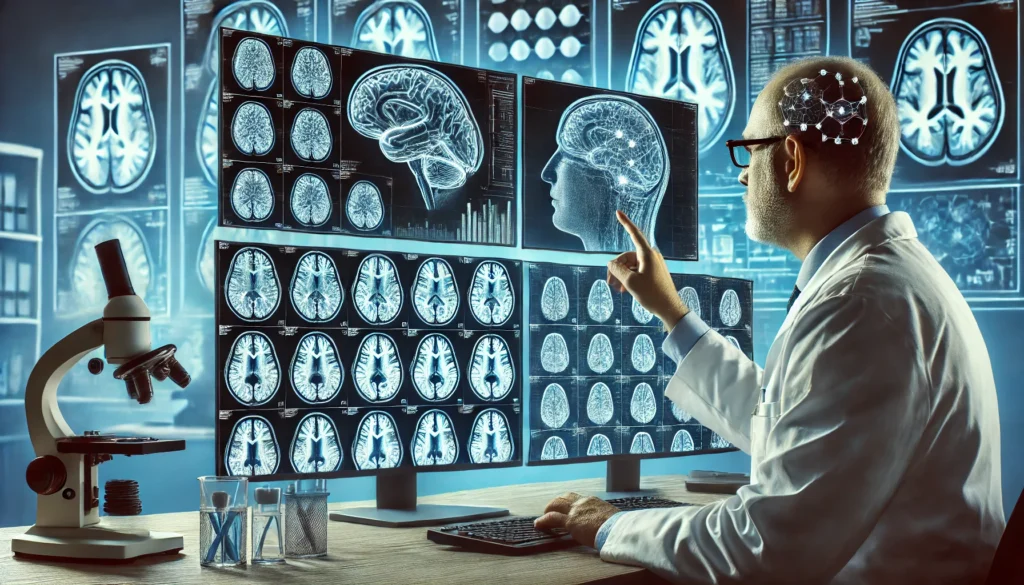Memory loss, particularly from dementia and Alzheimer’s disease, is a growing concern worldwide. It affects millions of individuals and their families, posing significant challenges to healthcare systems.
Historically, treatment options have been limited. They often focus on managing symptoms rather than addressing the underlying disease processes.
However, the landscape of memory loss treatment is changing. Recent breakthroughs in medication are offering new hope for patients and their families.
One such breakthrough is donanemab, a new medication that targets the amyloid-beta plaques associated with Alzheimer’s disease. Its potential effectiveness in slowing cognitive decline has sparked significant interest in the medical community.
This article will delve into the details of these new medications, their mechanisms of action, and their potential impact on patients’ lives. We’ll compare donanemab with donepezil, a commonly prescribed Alzheimer’s medication, and discuss the implications of the FDA’s accelerated approval of new Alzheimer’s drugs.
We’ll also explore how these developments could be integrated into health and wellness practices and reporting. Whether you’re a health and wellness coach, a science journalist, or a biohacker, this article aims to provide you with comprehensive, accessible, and practical information on the latest advancements in memory loss treatment.
Join us as we explore the future of memory loss treatment and the revolutionary medications that are changing the game.
You may also like: Top Memory Supplements to Combat Dementia
The Growing Burden of Memory Loss and Dementia
Memory loss and dementia profoundly impact individuals, families, and communities. As populations age, the incidence of dementia rises, becoming a significant public health challenge.
Alzheimer’s disease is the most common form of dementia, affecting over 50 million people worldwide. This number is expected to triple by 2050, posing a severe strain on healthcare systems globally.
The emotional and financial costs of caring for individuals with dementia are immense. It affects patients’ independence and quality of life, turning loved ones into caregivers and leading to a need for comprehensive support and resources. Addressing this growing burden requires innovative treatments and interventions.
Historical Treatments for Memory Loss: A Brief Overview
For decades, memory loss treatment primarily focused on symptom management rather than root causes. Donepezil and other cholinesterase inhibitors have been at the forefront.
These drugs aim to preserve cognitive function temporarily. By boosting neurotransmitter levels, they offer modest improvements in memory and attention.
However, their effectiveness diminishes over time. The quest for better treatments continued as these medications did not halt the disease’s progression.
Memantine followed, providing another avenue for addressing memory decline. Working on different neural pathways, it provided relief for some. Yet, like earlier treatments, it offered limited long-term benefits.
The limitations of these traditional medications spurred intense research efforts. A deeper understanding of Alzheimer’s mechanisms paved the way for new approaches to treatment. Today, the landscape is changing with breakthroughs targeting the disease’s underlying biology, marking a shift from purely symptomatic treatments to potentially disease-modifying therapies.
The Dawn of a New Era: Introduction to New Medications for Memory Loss
Recent advancements herald a transformative shift in memory loss treatment. Modern medications aim to address underlying disease processes rather than just symptoms.
Targeting the biological roots of Alzheimer’s holds promise. New drugs focus on amyloid-beta plaques and tau tangles, key pathological features.
These therapies emerge from decades of rigorous research. Breakthroughs in genetic understanding and molecular biology are paving the way.
The introduction of these drugs marks a hopeful era. Patients and caregivers now look to future treatments with renewed optimism and anticipation.
Donanemab: A New Hope in Alzheimer’s Treatment
Among the promising newcomers is donanemab. This innovative medication targets amyloid-beta deposits in the brain.
Donanemab has shown significant promise in early trials. By reducing plaque accumulation, it aims to slow cognitive decline and preserve memory.
A notable aspect of donanemab is its specificity. It binds exclusively to a modified form of amyloid-beta, enhancing effectiveness.
Such precision treatment is a departure from existing therapies. It represents a step towards more personalized and targeted medical interventions.
Donanemab vs Donepezil: A Comparative Analysis
When comparing donanemab to donepezil, key differences arise. Each drug functions through a unique mechanism:
- Action Mechanism: Donanemab targets amyloid-beta plaques; donepezil inhibits cholinesterase.
- Treatment Goal: Donanemab slows disease progression; donepezil enhances neurotransmitter availability.
- Efficacy Over Time: Donanemab aims for long-term benefits; donepezil offers temporary symptom relief.
This comparison highlights the shift towards disease-modifying therapies and away from symptomatic relief.
The FDA’s Accelerated Approval and What It Means for Patients
FDA’s accelerated approval process introduces new drugs more quickly. This approach acknowledges the urgent need for effective treatments.
With accelerated approval, access to promising medications like donanemab becomes timely. Patients facing cognitive decline gain earlier hope.
However, accelerated approval requires ongoing research. Continued studies ensure drug safety and efficacy long after their initial release.
For patients and caregivers, this regulatory pathway offers a lifeline. It promises quicker availability of cutting-edge treatments while maintaining rigorous oversight.

Clinical Trials and Effectiveness of New Memory Loss Medications
Clinical trials are the backbone of drug development, essential for testing safety and effectiveness. New memory loss medications, including donanemab, have undergone extensive evaluation.
These trials often span multiple phases, each with distinct objectives. Early-phase trials focus on safety and dosage, while later phases assess efficacy in larger populations. Donanemab, for instance, demonstrated promise in early trials by significantly slowing cognitive decline.
A recent multi-center study highlighted key trial findings:
- Improved Cognitive Performance: Participants showed better memory and thinking skills.
- Reduced Biomarkers: A decrease in amyloid-beta plaques was recorded.
- Enhanced Daily Living Activities: Patients maintained independence longer than expected.
These results suggest that new treatments not only target the disease process but also improve quality of life. Such outcomes are encouraging for patients and healthcare providers alike.
Importantly, ongoing post-approval trials continue to monitor long-term safety and benefits. This commitment ensures that breakthrough medications fulfill their potential, offering a new dawn in dementia care.
Understanding the Mechanisms: How New Drugs Target Memory Loss
Understanding drug mechanisms is crucial for developing effective treatments. Recent memory drugs target core pathological features, shifting focus from symptomatic to disease-modifying therapies.
Donanemab, a novel treatment, exemplifies this approach. It specifically targets amyloid-beta plaques in the brain, pivotal in Alzheimer’s progression. By binding to unique forms of amyloid-beta, donanemab disrupts plaque formation.
This mechanism contrasts with traditional therapies like cholinesterase inhibitors, which enhance neurotransmitter levels. Such drugs focus on boosting communication between neurons but don’t alter disease trajectory.
Emerging treatments also explore other targets beyond amyloid-beta. For instance, some drugs aim at tau proteins, another hallmark of Alzheimer’s pathology. These tau-targeting therapies help prevent neurofibrillary tangles.
Understanding these mechanisms aids in designing multi-target approaches. By addressing different aspects of the disease process, researchers hope to enhance treatment efficacy and halt cognitive decline more effectively.
Potential Side Effects and Safety Considerations
Like all medications, new memory loss drugs come with potential side effects. It is vital for healthcare providers to weigh these risks against benefits.
Common side effects with medications like donanemab may include brain swelling or hemorrhages, known as ARIA (Amyloid-Related Imaging Abnormalities). These effects are typically monitored through regular imaging studies.
Patient selection is crucial to minimize adverse effects. Genetic testing can determine suitability for amyloid-targeting therapies, ensuring that only those most likely to benefit receive treatment.
Continuous monitoring and patient education are essential. Open communication between healthcare providers and patients ensures early detection and management of side effects, promoting safe and effective treatment outcomes.
The Role of Biomarkers in Advancing Dementia Treatment
Biomarkers are pivotal in advancing dementia treatment. They provide measurable indicators of the disease’s presence and progression. In the context of dementia, common biomarkers include amyloid-beta and tau proteins, detectable through imaging or cerebrospinal fluid tests.
These markers offer several advantages. First, they enable earlier diagnosis, which is vital as early intervention often yields better outcomes. Biomarkers also allow for precise monitoring of disease progression and the efficacy of treatments. By using these indicators, clinicians can tailor therapies to individual patient needs, ensuring personalized care.
Furthermore, biomarkers are integral to drug development. They help identify suitable candidates for clinical trials, improving the chances of success. As research continues, the role of biomarkers will undoubtedly expand, leading to more targeted and effective treatment strategies for dementia and other neurodegenerative diseases. Their impact on diagnosis and therapy underscores their value in the ongoing battle against memory loss.
The Future of Memory Loss Treatment: What’s on the Horizon?
The future of memory loss treatment holds great promise. As research advances, new therapies may soon emerge, offering hope where once there was little. Scientists are exploring innovative treatments that target the disease at its core.
Gene therapy is one area of focus. By modifying or replacing faulty genes, it could potentially slow or prevent the progression of neurodegenerative diseases. Another promising approach is the use of stem cells, which may regenerate damaged brain tissues and restore cognitive function.
Continued collaboration between researchers and clinicians is crucial. It fosters the exchange of insights and accelerates the development of groundbreaking therapies. With such efforts, the horizon for memory loss treatment grows brighter, aiming for a future where effective management and even prevention of memory-related diseases become a reality.
The Impact of New Medications on Patient Care and Quality of Life
New medications are transforming patient care for those with memory loss. They offer more than just symptom management; they have the potential to slow disease progression. This allows patients to maintain independence for longer periods.
Improved cognition from these treatments enhances daily living activities. Patients experience better interaction with loved ones, fostering stronger relationships. Importantly, caregivers also notice less burden, enabling them to provide better support.
Enhanced quality of life is a significant outcome. Beyond physical health, new treatments contribute to mental well-being. Patients gain hope and optimism, profoundly affecting their overall outlook. As these medications become more prevalent, they promise to uplift the experience for both patients and caregivers alike.
Economic and Ethical Implications of New Dementia Medications
The advent of new dementia medications brings both economic benefits and challenges. On one hand, slowing disease progression could reduce long-term healthcare costs. Extended independence may lessen the need for intensive care and support services.
However, these medications can be expensive, raising ethical concerns about accessibility. Ensuring equitable access for all patients is crucial to avoid disparities in treatment options. Policymakers must address cost issues to make these drugs available to everyone.
Ethical considerations also extend to informed consent and patient autonomy. Patients and families must fully understand the implications of new treatments. Balancing cost, access, and ethical principles is essential as these groundbreaking therapies shape the landscape of dementia care.

Practical Advice for Health and Wellness Coaches
Health and wellness coaches play a key role in helping clients navigate memory loss treatments. Staying updated on new medications is crucial. These insights empower coaches to provide informed guidance to their clients.
A holistic approach is essential. Coaches can integrate new memory loss treatments with lifestyle changes. Regular physical activity and a balanced diet support cognitive health, enhancing the effectiveness of medications.
Here are some strategies for coaches:
- Educate Clients: Provide clear information on new memory drugs and their benefits.
- Promote Lifestyle Changes: Encourage habits that complement medical treatment.
- Monitor Progress: Track clients’ cognitive health and adjust plans as needed.
Using these practices, health and wellness coaches can better support their clients’ journey to improved cognitive health. By embracing a comprehensive approach, they can help enhance their clients’ quality of life and promote lasting wellness.
Translating Complex Information for Science Journalists
Science journalists face the challenge of distilling complex medical data into compelling stories. This requires both accuracy and clarity. Simplifying jargon without losing important details is key.
Focus on storytelling. Engage readers with narratives that highlight the human impact of new memory loss treatments. Personal stories and case studies can make scientific findings relatable and poignant.
Use analogies and comparisons to explain intricate concepts. Comparing new medications to older ones can clarify advancements. This approach assists readers in understanding the benefits and significance of these medical breakthroughs.
Journalists play a pivotal role in educating the public on memory loss treatments. By effectively conveying these developments, they can foster greater awareness and understanding. This in turn supports informed decision-making among readers and contributes to societal health literacy.
Biohacking and Cognitive Enhancement: The Role of New Memory Drugs
Biohackers constantly seek new ways to enhance mental performance. New memory medications are now gaining their interest. These drugs promise improved cognitive function, attracting those eager to boost mental capacities.
Innovations in dementia treatments open doors for cognitive enhancement. While initially for Alzheimer’s patients, these medications may benefit the general public. Biohackers explore potential off-label use to enhance focus and retention.
Using pharmaceuticals for non-medical reasons raises ethical questions. The balance between potential benefits and risks must be considered. Users should be informed about safety and consequences before embracing these drugs as enhancement tools.
Integrating scientific research with practical biohacking is essential. Biohackers need a cautious approach, respecting the primary aim of these medications—treating memory loss. Responsible use and an awareness of ongoing research ensure that cognitive enhancement aligns with ethical standards.

Conclusion: Embracing the Future of Memory Loss Treatment
The future of memory loss treatment shines brightly with new drug innovations. These advancements bring hope to millions affected by dementia and Alzheimer’s. As science progresses, more treatment options emerge, potentially altering disease management.
Embracing these breakthroughs involves collaboration among researchers, healthcare professionals, and policymakers. Together, they can ensure that innovative therapies reach those in need. By maintaining focus on holistic care and ethical distribution, society can improve the lives of patients and caregivers alike. The journey ahead invites optimism and the promise of better cognitive health.
Further Reading:
A Promising New Drug for Alzheimer’s Disease
Lecanemab, the New Alzheimer’s Treatment: 3 Things To Know
FDA approves treatment for adults with Alzheimer’s disease
Important Note: The information contained in this article is for general informational purposes only, and should not be construed as health or medical advice, nor is it intended to diagnose, prevent, treat, or cure any disease or health condition. Before embarking on any diet, fitness regimen, or program of nutritional supplementation, it is advisable to consult your healthcare professional in order to determine its safety and probable efficacy in terms of your individual state of health.
Regarding Nutritional Supplements Or Other Non-Prescription Health Products: If any nutritional supplements or other non-prescription health products are mentioned in the foregoing article, any claims or statements made about them have not been evaluated by the U.S. Food and Drug Administration, and such nutritional supplements or other health products are not intended to diagnose, treat, cure, or prevent any disease.


